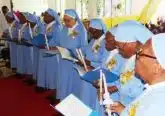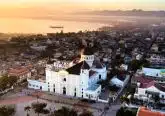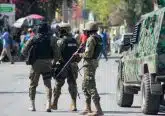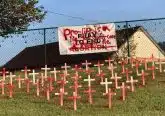Haitians in Miami shocked by assassination of Jovenel Moïse
by CNA Staff
Miami, Fla., Jul 8, 2021 / 14:01 pm
The administrator of the Archdiocese of Miami’s mission for Haitians said Wednesday that the community is in shock and disbelief following the assassination of Jovenel Moïse, Haiti’s president.
“People are in a state of disbelief and a state of shock that a son of the country got murdered — a leader, a human being, a father. This is not a time for rejoicing. It hurts everybody whether you liked him or not,” Fr. Reginald Jean-Mary, administrator of Notre-Dame d’Haiti Mission, told the Florida Catholic July 7.
Moïse was shot dead, and his wife injured, when gunmen opened fire on their private residence near the capital, Port-au-Prince, July 7. Moïse was 54 years old.
Haitian police said that four of the suspected gunmen were killed and two others arrested late on July 7, but some remain at large.
Fr. Jean-Mary said that “there is a sense of calm, but you wonder what kind of calm that is and what is coming, with all those heavily armed gangs and no prime minister and no idea who is replacing the country’s leadership.”
He added that in Haiti “fundamental values are being violated every day and no sense of order. It is like everybody can do whatever they want, corruption levels are very high.”
The mission held a holy hour for Haiti on Wednesday evening, and to pray for Moïse’s wife, Martine. She is being treated at a hospital in Miami, and is in critical but stable condition, according to the BBC.
Haiti has been battling a spike of gang violence and kidnappings for ransom in recent months.
Violent protests had also occurred in the country since July 2018, with protesters calling for Moïse’s resignation. He had been accused of mismanaging billions in aid given to the country after Hurricane Matthew.
Parliamentary elections were to have been held in October 2019, but they were delayed and Moïse had been ruling by decree. A general election is scheduled in September.
Moïse had nominated a new prime minister July 6, but as he had not been sworn in, the existing prime minister is continuing to act as such, and as president.
The Archdiocese of Port-au-Prince said in April that gang violence had reached “unprecedented” levels in the country.
A criminal gang in Haiti calling itself “400 Mazowo” kidnapped 10 Catholics, including priests and nuns, on April 11. The kidnap victims were all eventually released weeks later after the Catholic Church openly criticized the government’s “inaction,” and called for all Catholic schools and institutions — except hospitals and clinics — to close in protest.
The strike led President Moise to announce a reshuffling of the government, including the resignation of the prime minister, Joseph Jouthe.
Haiti has also been affected by other crises, including natural disasters and a lack of health care infrastructure to deal with the COVID-19 pandemic.
In May, the Biden administration said it was redesignating Haiti for Temporary Protected Status. The designation allows people who are unable safely to return to their home nations because of armed conflict, other violence, natural disasters, or other extraordinary and temporary circumstances to remain in the United States while the situation in their home country resolves. It protects them from deportation and grants them permission to work.
Archbishop Launay Saturné of Cap-Haïtien said that the Haitian bishops “deplore and condemn” the “inadmissible and revolting murder” of Moïse.
The bishops’ conference president added that the spiral of violence “will never help our country to get out of this political impasse.”
He said that the solution was “dialogue, consensus, and the spirit of compromise for the best interests of the nation, for the common good of the country.”













